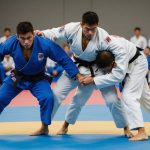Essential Psychological Strategies to Enhance Confidence in Struggling Football Players
Confidence is a crucial component of a football player’s arsenal, influencing their performance, decision-making, and overall success on the field. When players struggle with confidence, it can have a ripple effect on their game, impacting not only their individual performance but also the team’s dynamics. Here, we will delve into the essential psychological strategies that can help football players build and maintain confidence.
Understanding the Importance of Confidence in Football
Confidence is more than just a feeling; it is a mindset that can be developed and strengthened through various psychological techniques. In football, confidence can make the difference between a player who hesitates and one who takes decisive action.
Have you seen this : Mastering On-Field Communication: Top Strategies for Football Players to Connect and Conquer
“Confidence is not ‘I will succeed,’ but ‘I can learn and get better,’” says Dr. Jason Selk, a renowned sports psychologist. This mindset is critical because it allows players to approach challenges with a growth mindset, rather than fear of failure.
Mental Preparation and Mindset
Visualization and Imagery Techniques
Visualization is a powerful tool in sports psychology that helps athletes prepare mentally for the game. By vividly imagining themselves performing well, players can enhance their self-confidence and mental toughness. Here’s how it works:
This might interest you : Exploring the Influence of Fan Loyalty on Football Team Success and Strategies for Clubs to Amplify Support
- Pre-Game Visualization: Before a match, players can visualize themselves making successful passes, scoring goals, and handling pressure situations effectively. This helps in building a positive mental image and boosts confidence.
- Post-Game Reflection: After a game, visualizing the positive moments and replaying them in their mind can reinforce good performance and help in learning from mistakes.
Self-Talk and Positive Affirmations
Self-talk is another critical aspect of mental preparation. Positive self-talk can significantly impact a player’s confidence and performance.
- Positive Affirmations: Coaches and sports psychologists often recommend that players use positive affirmations to reinforce positive self-talk. For example, “I am capable and prepared,” or “I can handle this pressure.”
- Constructive Criticism: While positive affirmations are important, constructive criticism can also be beneficial. It helps players identify areas for improvement without undermining their confidence.
Goal Setting and Cognitive Restructuring
Setting Achievable Goals
Goal setting is a well-documented strategy in sports psychology that helps athletes stay focused and motivated. Here’s how it can be applied:
- Short-Term Goals: Setting specific, short-term goals can help players feel a sense of accomplishment and build confidence. For example, “I will make three successful passes in the next game.”
- Long-Term Goals: Long-term goals provide direction and motivation. For instance, “I will improve my shooting accuracy by the end of the season.”
Cognitive Restructuring
Cognitive restructuring involves changing negative thought patterns into more positive and constructive ones. Here’s an example:
- Negative Thought: “I always mess up under pressure.”
- Positive Restructure: “I have handled pressure situations well before, and I can do it again.”
Physical and Emotional Well-being
Physical Conditioning and Nutrition
Physical fitness and nutrition are foundational to a player’s confidence. Here are some key points:
- Maintaining Physical Fitness: Regular workouts that focus on strength, endurance, speed, agility, and flexibility are essential. In-season workouts should be designed to preserve gains made in the off-season while avoiding overtraining.
- Balanced Nutrition: A balanced and nutritious diet supports energy levels, muscle recovery, and overall health. Proper nutrition is crucial for sustaining high performance throughout the season.
Rest and Recovery
Adequate rest and recovery are vital for maintaining physical and mental well-being.
- Sleep: Getting enough sleep is crucial for physical recovery and mental rejuvenation. Aim for 7-9 hours of sleep per night.
- Recovery Techniques: Techniques such as stretching, foam rolling, and massage can aid in recovery and reduce muscle soreness.
Team Dynamics and Support
Building Team Chemistry
Good teamwork and strong relationships among teammates can significantly impact a player’s confidence.
- Communication: Effective communication is key to building team chemistry. Players should work on clear and respectful communication both on and off the field.
- Supportive Environment: A supportive team environment where players feel valued and encouraged can boost individual confidence.
Psychosocial Support
Psychosocial support from coaches, teammates, and family is crucial for athlete well-being.
- Coaches’ Role: Coaches can play a significant role in providing psychological support. They can help players develop mental skills, offer constructive feedback, and create a positive team culture.
- Team Support: Teammates can provide emotional support and encouragement, helping players feel more confident and part of a cohesive unit.
Practical Strategies for Building Confidence
Here are some practical strategies that coaches, sports psychologists, and players can use to build confidence:
Simulated Pressure Training
- Game-Like Situations: Training in game-like situations can help players prepare for the pressure of actual matches. This includes simulated game scenarios and high-intensity drills.
Mental Rehearsal
- Visualization Drills: Incorporate visualization drills into training sessions. For example, players can visualize themselves performing well in different game scenarios.
Constructive Feedback
- Positive Feedback: Coaches should provide positive feedback that reinforces good performance. This helps in building confidence and encouraging players to continue improving.
- Constructive Criticism: When giving criticism, it should be constructive and focused on specific actions rather than personal traits.
Table: Comparing Psychological Strategies for Confidence Building
| Strategy | Description | Benefits |
|---|---|---|
| Visualization | Imagining successful performances before and after games. | Enhances mental toughness, boosts confidence. |
| Self-Talk | Using positive affirmations to reinforce positive self-talk. | Improves mental state, reduces anxiety. |
| Goal Setting | Setting short-term and long-term goals. | Provides direction, motivation, and a sense of accomplishment. |
| Cognitive Restructuring | Changing negative thought patterns into positive ones. | Reduces stress, improves mental resilience. |
| Physical Conditioning | Maintaining physical fitness through regular workouts. | Supports physical performance, enhances overall well-being. |
| Rest and Recovery | Ensuring adequate rest and using recovery techniques. | Aids in physical recovery, reduces muscle soreness. |
| Team Dynamics | Building team chemistry and a supportive environment. | Enhances teamwork, provides emotional support. |
| Psychosocial Support | Support from coaches, teammates, and family. | Improves mental health, provides emotional support. |
| Simulated Pressure Training | Training in game-like situations to prepare for pressure. | Prepares players for game pressure, enhances mental toughness. |
Real-Life Examples and Anecdotes
The Story of Cristiano Ronaldo
Cristiano Ronaldo is a prime example of how consistent mental and physical training can build confidence. Known for his rigorous training regimen and mental preparation, Ronaldo often speaks about the importance of visualization and positive self-talk in his success.
“I always believed that I could be the best,” Ronaldo said in an interview. “I visualized myself scoring goals and winning championships. That mental preparation was key to my success.”
The Role of Coaches
Coaches play a pivotal role in helping players build confidence. For instance, a coach might use positive reinforcement by highlighting a player’s strengths and achievements.
“Coaches who focus on building confidence in their players often see significant improvements in performance,” notes Dr. Daniel Gould, a sports psychologist. “This is because confidence is closely linked to motivation and resilience.”
Building confidence in struggling football players is a multifaceted process that involves mental preparation, physical conditioning, and a supportive team environment. By incorporating strategies such as visualization, positive self-talk, goal setting, and cognitive restructuring, players can enhance their confidence and improve their performance on the field.
As Jim Valvano, the former N.C. State basketball coach, once said, “Don’t give up; don’t ever give up.” This mantra encapsulates the resilience and determination that are essential for athletes to overcome challenges and build lasting confidence.
Final Tips for Coaches and Players
- Be Patient: Building confidence takes time. Be patient and consistent in your efforts.
- Seek Professional Help: If confidence issues persist, consider seeking help from a sports psychologist.
- Focus on the Process: Instead of just focusing on the outcome, emphasize the process of improvement and learning.
- Celebrate Small Wins: Celebrating small victories can help build momentum and reinforce positive behaviors.
By following these strategies and maintaining a positive, growth-oriented mindset, football players can overcome struggles with confidence and achieve their full potential in the sport.











